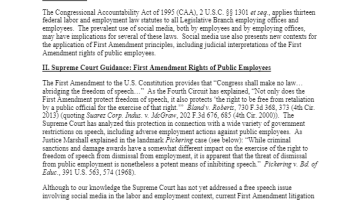I. Introduction
The Congressional Accountability Act of 1995 (CAA), 2 U.S.C. §§ 1301 et seq., applies thirteen federal labor and employment law statutes to all Legislative Branch employing offices and employees. The prevalent use of social media, both by employees and by employing offices, may have implications for several of these laws. Social media use also presents new contexts for the application of First Amendment principles, including judicial interpretations of the First Amendment rights of public employees.
II. Supreme Court Guidance: First Amendment Rights of Public Employees
The First Amendment to the U.S. Constitution provides that “Congress shall make no law… abridging the freedom of speech…” As the Fourth Circuit has explained, “Not only does the First Amendment protect freedom of speech, it also protects ‘the right to be free from retaliation by a public official for the exercise of that right.’” Bland v. Roberts, 730 F.3d 368, 373 (4th Cir. 2013) (quoting Suarez Corp. Indus. v. McGraw, 202 F.3d 676, 685 (4th Cir. 2000)). The Supreme Court has analyzed this protection in connection with a wide variety of government restrictions on speech, including adverse employment actions against public employees. As Justice Marshall explained in the landmark Pickering case (see below): “While criminal sanctions and damage awards have a somewhat different impact on the exercise of the right to freedom of speech from dismissal from employment, it is apparent that the threat of dismissal from public employment is nonetheless a potent means of inhibiting speech.” Pickering v. Bd. of Educ., 391 U.S. 563, 574 (1968).
Although to our knowledge the Supreme Court has not yet addressed a free speech issue involving social media in the labor and employment context, current First Amendment litigation involving a public employee’s right to engage in more traditional forms of expression generally follows a two-part inquiry: (1) did the government employee speak as a citizen on a matter of public concern? If the answer is no, there is no First Amendment cause of action. If the answer is yes, the possibility of a First Amendment claim arises, and courts ask (2) did the government employer have an adequate justification for treating the employee differently from any other member of the general public?

